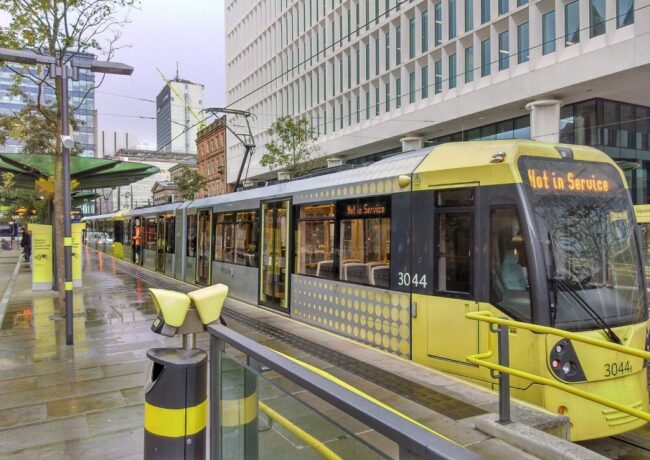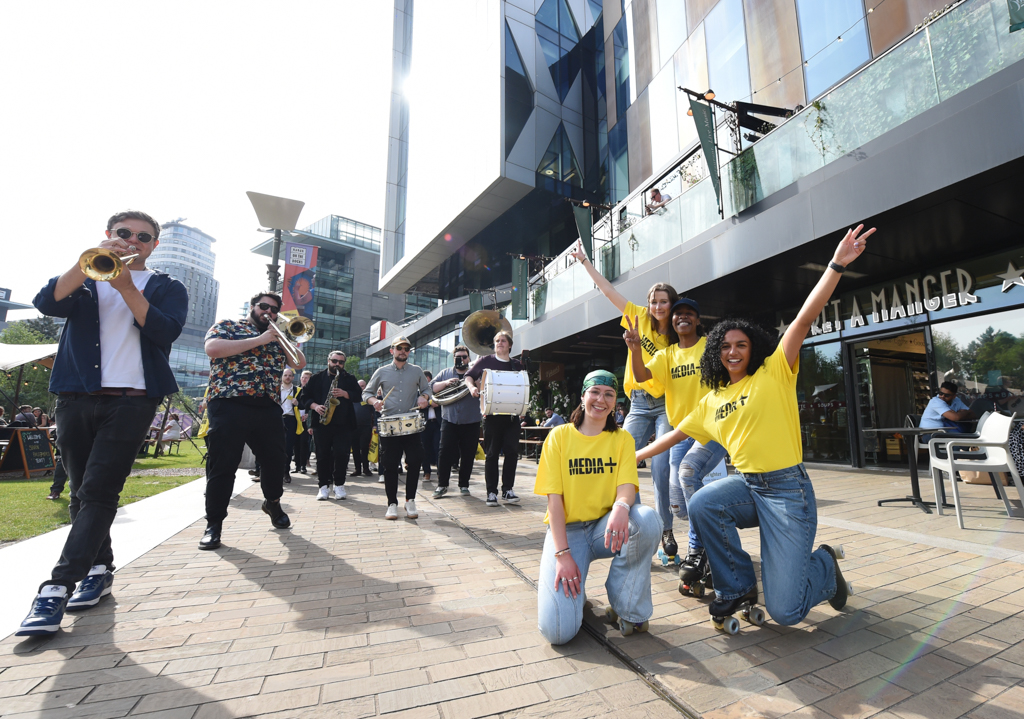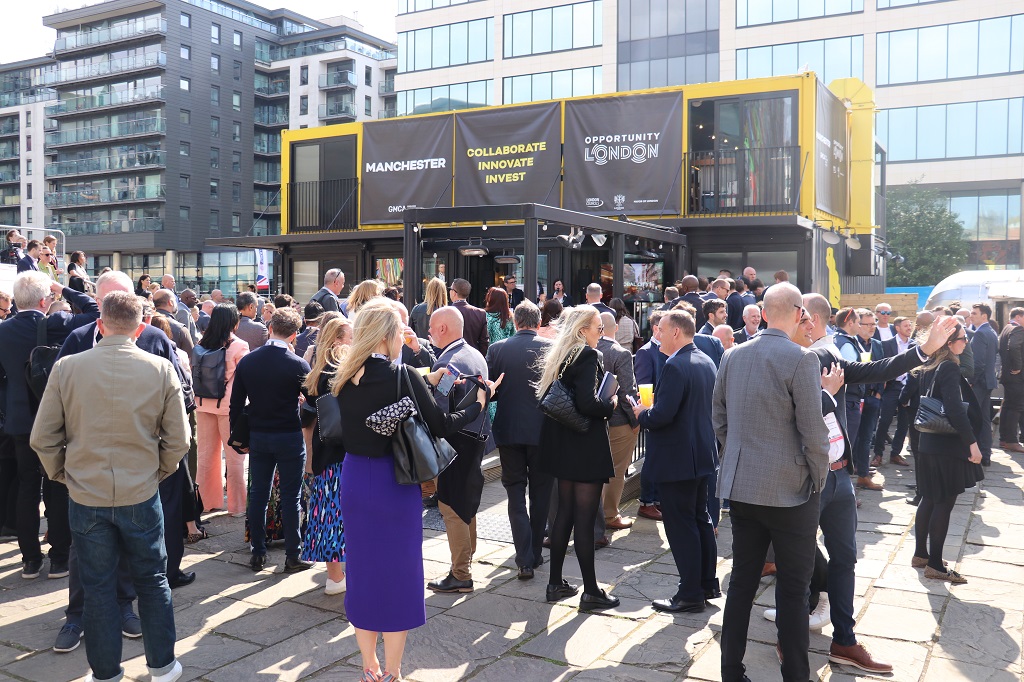Burnham calls on Government to fund Congestion Plan
While Andy Burnham’s Congestion Plan has put £243m towards cycling, walking, and increased capacity on the Metrolink, the Mayor has warned “long-term” central Government funding will be needed to deliver a £700m proposed package of transport improvements across Greater Manchester.
The Mayor outlined a series of planned investments in transport across the city region, following a consultation process which started last summer and received feedback from more than 7,000 people and organisations.
These include:
- An £83m investment in up to 27 additional Metrolink trams to increase capacity at peak times by over a quarter
- £160m for a Mayor’s Challenge Fund which will help implement cycling and walking infrastructure
- £42m for the second phase of the Cycling City Ambition Grant to be put towards cycling routes
- A £400m programme to upgrade junctions and address “key bottlenecks” including along the A6 in Stockport; the Princess Parkway; and Bury New Road.
- 40,000 additional seats on rail services by December 2019 across Northern and Transpennine Express routes
Around £243m has already been secured by the city region from the Government’s Transforming Cities Fund, and this funding will be used over the next three years to supplement existing the Local Growth Deal’s programme of works.
This money will be divided between cycling and walking infrastructure, and the additional investment in the Metrolink.
The Transforming Cities Fund money will be split with £17m earmarked for 2018/19; £55m for 2019/20; £72m for 2020/21; and £99m for 2021/22.
However, the report admitted that Greater Manchester would need “further support and long-term funding from central Government” to build on the Transforming Cities funding.
The report added that the GMCA would “continue to explore a range of options” to fund the proposals, and more detail would be set out in a forthcoming report, due to be published in the spring.
The two areas due to benefit directly from the £243m fund are the Metrolink to the tune of £83m, and walking and cycling infrastructure, backed by £160m.
For the Metrolink, the money will be focussed on increasing capacity to deal with rising passenger numbers and the opening of the Trafford Park line.
The busiest lines are the Altrincham to Bury lines, followed by the East Didsbury and Rochdale lines. A report to the GMCA found that for both the Bury and Altrincham lines, seat capacity per carriage is exceeded from the first stop, while on the East Didsbury line, seats are typically full by the third stop.
Trams from Altrincham to Manchester also reach their “crush capacity” of 200 people per tram when they reach Sale.
To help remedy this, an initial order of 24 more trams will be placed by TfGM by 30 June 2018, with a further three trams to be ordered depending on whether the business case for the extension of the Metrolink to Manchester Airport’s Terminal 2 is approved.
The order of up to 27 trams has an estimated capital cost of £100m, with £83m allocated from the Transforming Cities Fund. The remainder is likely to be funded by borrowing.
The extra trams would be used to double all the existing Bury to Piccadilly and Altrincham to Piccadilly services, and will increase the number of doubles running on the East Didsbury to Shaw service.
For the road network, the Congestion Plan outlines proposals to invest in smart traffic signals at 90 junctions across the area, while a High Occupancy Vehicle Lane will be piloted on one of the city’s busiest transport corridors.
Greater Manchester will also request powers from Government to explore a lane rental scheme, which charges organisations for the time their roadworks occupy the highways. This has been trialled in London and has seen increased collaboration between utilities companies since the pilot scheme began in 2015.
A “corridor management team” will be introduced to identify the causes of delays on the road network, and will be tasked with developing small works packages to improve roads across Greater Manchester.
Overall, the proposals for the road network are estimated to cost £400m, but the report does not specify where the funding would come from.
Burnham said: “Congestion is a serious problem in Greater Manchester, which affects people’s health and wellbeing, as well as access to employment and education opportunities.
“Every week, my Twitter feed and inbox are filled with accounts of the difficulties people experience in travelling to work, dropping the kids off at school or getting to appointments on time. There’s no quick fix or single solution to tackling congestion and it requires a long-term approach, but there are things we could be doing better.
“So I’d like all of Greater Manchester to agree to a congestion deal; transport bodies and businesses will work together to give people real choice about their travel options; whilst Greater Manchester residents must also play their part in the deal by making changes to how and when they travel and by choosing public transport, cycling or walking as an alternative to the car where possible.
“If everyone does their bit, from businesses to bus operators and from council to commuters, we can work together to reduce congestion and make Greater Manchester an even better place to live and work in the future.”





Cycling , walking etc all very nice. Sort out the fake road restrictions that narrow roads . Sort out the traffic lights to favour heavy directional flows . Get rid of bus lanes which are full of empty buses. Stop using transport as the political football that it is. Do not listen to Sustrans and their biased transport nonsense . That’s just for starters ….
By Roberto
Rather than keep putting his hat out to Whitehall, why doesn’t he implement a workplace parking levy – which could pay for most of this stuff?
By Hokey Cokey
Safety on the trams should be the priority.Stop feral youths from ruining peoples’ journeys.700 million is a pittance however when you consider the 20 billion Westminster paid for Crossrail.One of many huge schemes over the last 20 years for Londoners.
By Elephant
What he needs to do is assess the potential of traffic management and exchange schemes, such as Texxi, this could pay for a lot of extras he his advocating.
By Motorway queuer
Great news! Clearly word of my daily protests by farting on my congested tram commute has finally reached the top.
By Superhans
Well said Roberto ask any bus driver in town and they will tell you the congestion is deliberate , if these traffic calming schemes were working why have we got the worst traffic pollution in the country. They are going to spend a fortune on cycle ways but cyclist wont use them because they are not swept and they get punctures from all the debris in them .
By Barny